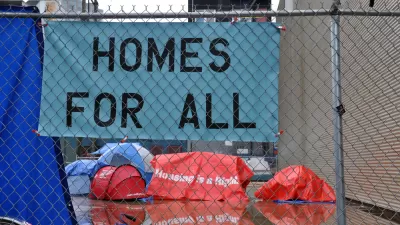With few enforcement mechanisms even in cities that have bans on source-of-income discrimination on the books, it’s up to nonprofit lawyers and tenants to sue landlords for retribution.

Housing and disability rights advocacy groups around the country are suing cities to spur enforcement of housing discrimination laws, which many have on the books but rarely enforce, writes Roshan Abraham for Next City. According to one estimate by Aaron Carr, founder and executive director of the national housing watchdog Housing Rights Initiative (HRI), roughly half of landlords and housing brokers tend to turn down Section 8 vouchers.
In Los Angeles, the Disability Rights Education and Defense Fund (DREDF) sued the city on behalf of one resident who was discriminated against based on his Section 8 vouchers, with positive results for himself and for other tenants. “The lawsuit reached settlements with two of the defendants in April, both owners of multi-family apartments in LA. The owners agreed to provide fair housing training for staff, state in advertisements that they accept Section 8, and report data on Section 8 applications and acceptance to DREDF. Defendants will also pay $35,000 to Gardner.”
For Gardner, the lawsuit was a last resort after government avenues failed to help him. The city’s law against source-of-income discrimination “doesn’t implement any fines or fees for landlords or lay out penalties; rather, it shifts enforcement to civil court, allowing tenants to recoup damages equal to three months rent or three times the ‘actual damages,’ whichever is higher”—putting the responsibility for enforcement, essentially, on the tenants.
FULL STORY: A Lawsuit That’s Forcing L.A. To Enforce Its Housing Voucher Discrimination Ban

Planetizen Federal Action Tracker
A weekly monitor of how Trump’s orders and actions are impacting planners and planning in America.

San Francisco's School District Spent $105M To Build Affordable Housing for Teachers — And That's Just the Beginning
SFUSD joins a growing list of school districts using their land holdings to address housing affordability challenges faced by their own employees.

The Tiny, Adorable $7,000 Car Turning Japan Onto EVs
The single seat Mibot charges from a regular plug as quickly as an iPad, and is about half the price of an average EV.

Seattle's Plan for Adopting Driverless Cars
Equity, safety, accessibility and affordability are front of mind as the city prepares for robotaxis and other autonomous vehicles.

As Trump Phases Out FEMA, Is It Time to Flee the Floodplains?
With less federal funding available for disaster relief efforts, the need to relocate at-risk communities is more urgent than ever.

With Protected Lanes, 460% More People Commute by Bike
For those needing more ammo, more data proving what we already knew is here.
Urban Design for Planners 1: Software Tools
This six-course series explores essential urban design concepts using open source software and equips planners with the tools they need to participate fully in the urban design process.
Planning for Universal Design
Learn the tools for implementing Universal Design in planning regulations.
Smith Gee Studio
City of Charlotte
City of Camden Redevelopment Agency
City of Astoria
Transportation Research & Education Center (TREC) at Portland State University
US High Speed Rail Association
City of Camden Redevelopment Agency
Municipality of Princeton (NJ)





























